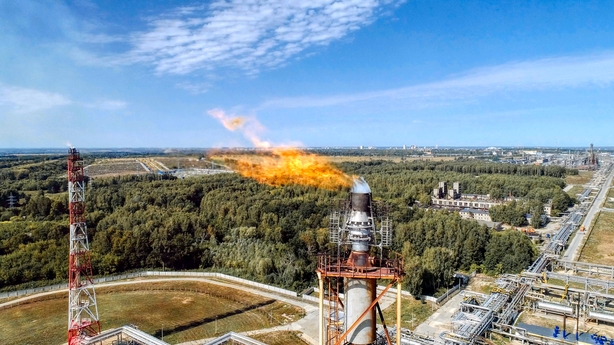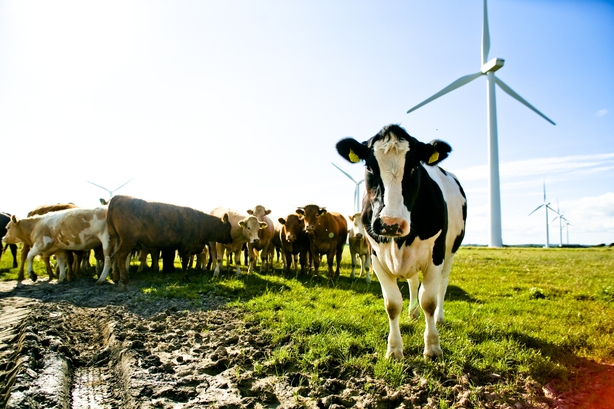Ireland - and the world - must rapidly respond to the critical challenge of climate change and has a limited window of opportunity to get it right, an Oireachtas committee has heard.
The next three decades are "absolutely critical", Professor Barry McMullin, Dublin City University, said.
If we fail to hit "peak temperature in the next 30 years," then it will be too late and climate change will slip beyond "any prospect of human adaptation," he warned.
The Joint Committee on Agriculture met to consider methane emissions.
These must be reduced "rapidly and substantially," Prof McMullin said.
Ireland has "unusually large per capita emissions of methane" which "are dominated by ruminant agriculture," he noted.
The UN Intergovernmental Panel on Climate Change has found that methane is responsible for almost half of the approximately 1.1 degrees of warming - and almost as much as carbon dioxide (CO2).

But Prof Myles Allen of Oxford University noted that, as most methane comes from fossil fuels, agricultural emissions must be kept in context.
"Even if we were to eliminate methane emissions from the entire ruminant herd worldwide, we'd shave a few hundredths of a degree off global temperatures," he told the committee.
This is just "a few years of fossil-fueled warming", he added, calling fossil fuel use "the elephant in the room".
Sinn Féin TD Matt Carthy suggested that major carbon emitters benefit from a "see no evil, hear no evil" attitude, where-as farmers are expected to change at the "speed of light".
Prof Peter Thorne, Director of Climate Analysis at Maynooth University, agreed that farmers are being unfairly singled out.
He warned against the 97% of people living in Ireland who are not farmers trying to make emissions "somebody else's problem" by blaming agriculture.
"Even were agricultural emissions to reach zero, we would still have approximately two thirds of our emissions remaining outstanding," he said.
The three main greenhouse gases are carbon dioxide, methane and nitrous oxide.
Methane does not last as long in the atmosphere, and its distinctive qualities have led to different views on how emissions should be calculated.
Prof Allen pointed to "a lot of unnecessary animosity" in the debate and said we could "defuse the tension between the farming community and the Government" by simply changing how emissions are measured.
Carbon neutrality would then "easily be seen as an opportunity for farming," he said.
Independent TD Carol Nolan appealed for "common sense", and greater recognition of "the positive work that is being done by beef farmers in sequestering carbon".
Mr Carthy said that there is a need to record carbon sequestration, storage and emission, on a farm-by-farm basis so that good practices are rewarded, and bad practices tackled.
The current method of calculating emissions involves treating methane as a CO2 equivalent, and then calculating a "carbon footprint," Myles Allen said.
But this "doesn't actually reflect the impact on global temperature," he maintained.

Prof Allen suggests keeping the current system - as it is widely used - but adding in another calculation in all reporting, from the individual farm up to the national level.
He believes that this would directly measure the impact of methane emissions on global temperature.
Ireland could then take up a global leadership role and encourage other countries to adopt a similar approach.
This could be "easily" done, Prof Allen said, but he faced strong opposing views.
Dr Joeri Rogelj, Reader in Climate Science and Policy at the Centre for Environmental Policy, Imperial College London, warned that such a change could "perversely reward historically high methane polluters".
It could "weaken the ambition of the Paris Agreement" which commits nations to carbon neutrality, meaning that "global warming will merely stabilise but not decline".
Prof McMullin also said that "the problem is there's only so much you can do on CO2," and no matter how much Ireland's does, "we will still exceed our equitable budget on warming".
If Ireland wants to pull its weight, we will then have to make up our shortfall by removing CO2 from the atmosphere, an onerous and unproven process, he said.
Cutting methane is the only way to get Ireland's emissions down and so - to some extent - reduce this carbon-removal burden, the professor said.
"We're the ones who are free-riding", who are not playing our part, he said, adding that continued poor performance "will not play well in international negotiations".


